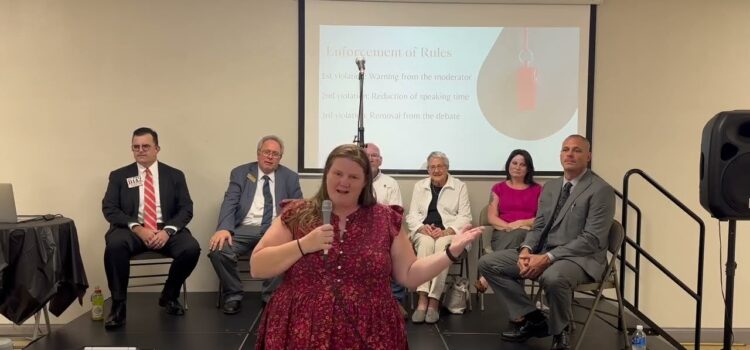The recent Winter Springs West Side Candidate Debate brought critical issues to the forefront, giving voters a clearer picture of how each candidate plans to shape the future of our community. With topics ranging from political unity and infrastructure to land development and the use of city funds, the debate shed light on the diverse approaches each candidate has to offer.
As a Winter Springs City Commissioner, I’ve always believed that transparency, honesty, and informed decision-making are essential to moving our city forward. With that in mind, I wanted to share a recap of the debate to help residents make informed choices about the future leadership of our city.
Political Unity & Future Challenges
Political unity was a central theme, especially given the divisions that have emerged over the past few years. Several candidates agreed that fostering collaboration and leadership across party lines is essential to tackling the key challenges Winter Springs faces—particularly the urgent need for infrastructure improvements and thoughtful long-term city planning.
- Paul Diaz stood out with his practical, action-oriented approach. He focused heavily on the need to unify the city by resolving critical infrastructure failures, particularly with the wastewater treatment plants. His argument was clear: unity comes from results, and the city cannot afford further delays on issues as urgent as wastewater management.
- Matt Benton reiterated the need to complete ongoing projects, though his response lacked clarity, leaving some voters unsure about his specific plans.
- Sarah Baker emphasized the importance of open communication and involving the community in decision-making to foster unity.
- Rob Elliot and Mark Caruso both agreed on the need to address immediate infrastructure concerns, though Elliot pointed out the restrictions posed by Sunshine Laws, which make it difficult for commissioners to collaborate outside public meetings.
Land Development & Conservation
Land development was another key issue, particularly the future of the old golf course property near the Highlands. There is broad agreement that any development must align with the character of the community while addressing concerns like traffic, flooding, and environmental impact.
- Most candidates favored maintaining the conservation easement on the golf course, with Paul Diazpointing out that 10 to 22 acres might be needed for wastewater plant development. Diaz urged a realistic, balanced approach to development that prioritizes the needs of residents and avoids unnecessary political maneuvering.
- Rob Elliot noted that alternative plans are being explored in case the city cannot acquire this land.
- Both Karen Meyer and Matt Benton supported a supermajority vote requirement to lift any conservation easements, ensuring that such decisions would only be made if absolutely necessary.
- Sarah Baker expressed her concerns about the environmental impact of development, stressing the importance of careful planning to prevent future flooding—an issue that many residents are all too familiar with.
As a sitting commissioner, I’ve been very vocal in my opposition to lifting conservation easements, and I was the first public official to take a stand against any effort to remove them. Our city’s natural spaces are invaluable, and any development decisions must be made with the long-term preservation of our environment in mind.
Stormwater & Water Infrastructure
The debate also tackled one of the most pressing issues: the city’s stormwater and water infrastructure. With aging systems and frequent flooding, candidates agreed that this is an issue that needs immediate attention.
- Paul Diaz passionately spoke about the need to modernize the city’s infrastructure, citing his personal experiences from past hurricanes as a driving force behind his commitment to resolving these issues. His clear, decisive approach to cutting through bureaucracy resonated with many in attendance.
- Rob Elliot and Mark Caruso also highlighted the urgency of addressing failing wastewater plants, noting that there is limited time to resolve these issues before the city faces potential consequences from state authorities. Elliot mentioned an ongoing stormwater study, but the slow pace of progress remains a concern for many residents.
Penny Tax & Resource Allocation
Finally, the debate addressed the question of how to fund these necessary improvements, particularly through the renewal of the penny sales tax. While most candidates supported renewing the tax to fund infrastructure projects, there was debate over how the funds have been managed in the past.
- Paul Diaz was critical of the mismanagement of penny tax funds, calling for greater transparency and accountability to ensure that taxpayer money is used for its intended purpose: infrastructure upgrades. He emphasized that the city needs a leadership reset to restore trust in how funds are handled.
- Matt Benton defended the city’s use of the penny tax, arguing that protocols had been followed. However, given the slow pace of progress on vital infrastructure, some voters remain skeptical.
- Sarah Baker echoed the need for better transparency, pointing out that residents are rightfully concerned when infrastructure funds are diverted to other projects, leaving critical issues unaddressed.
Looking Forward
The Winter Springs West Side Candidate Debate offered residents a chance to hear directly from those who seek to represent us, and it highlighted the urgent need for decisive leadership on infrastructure and conservation. While all the candidates brought valuable perspectives, Paul Diaz stood out for his practical, results-driven approach, emphasizing that unity and progress come from action. On the other hand, Matt Benton’s lack of clarity and Rob Elliot’s defense of past delays left some voters questioning their ability to address the city’s most pressing needs.
As a commissioner, my top priority has always been to balance economic growth with environmental preservation, ensuring that Winter Springs remains a thriving, beautiful community for years to come. This debate reaffirmed the importance of staying informed and engaged as we continue working together to address the challenges and opportunities ahead.
Together, we can ensure that Winter Springs’ future remains as bright as its past.








